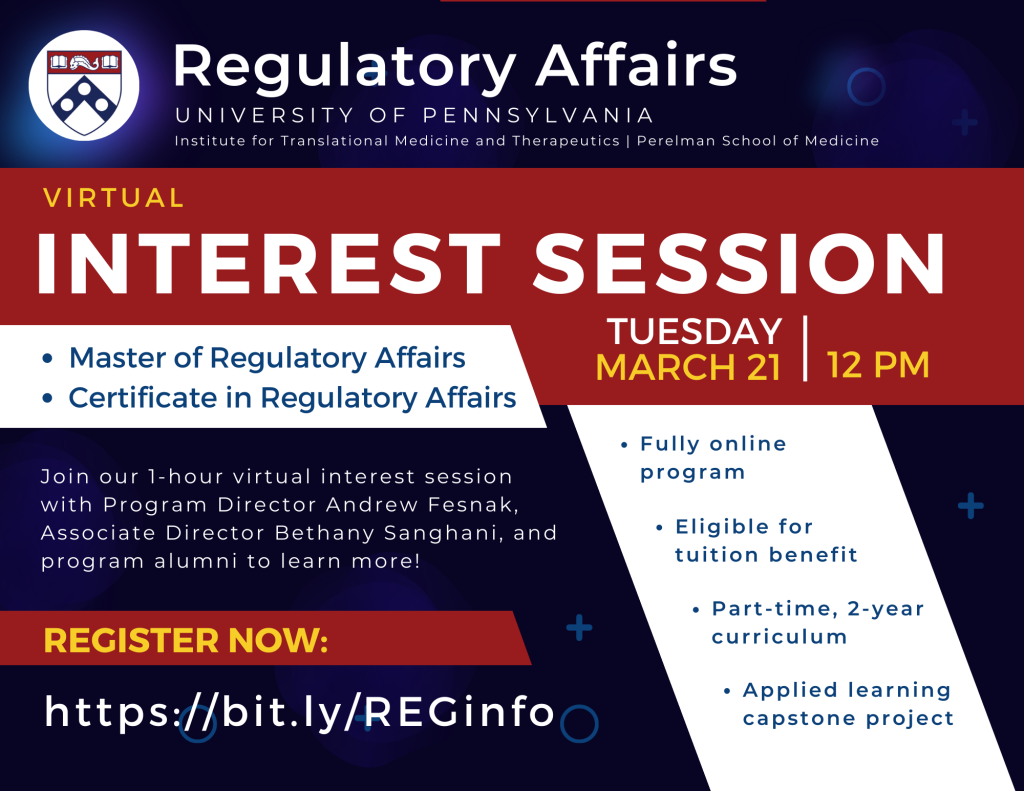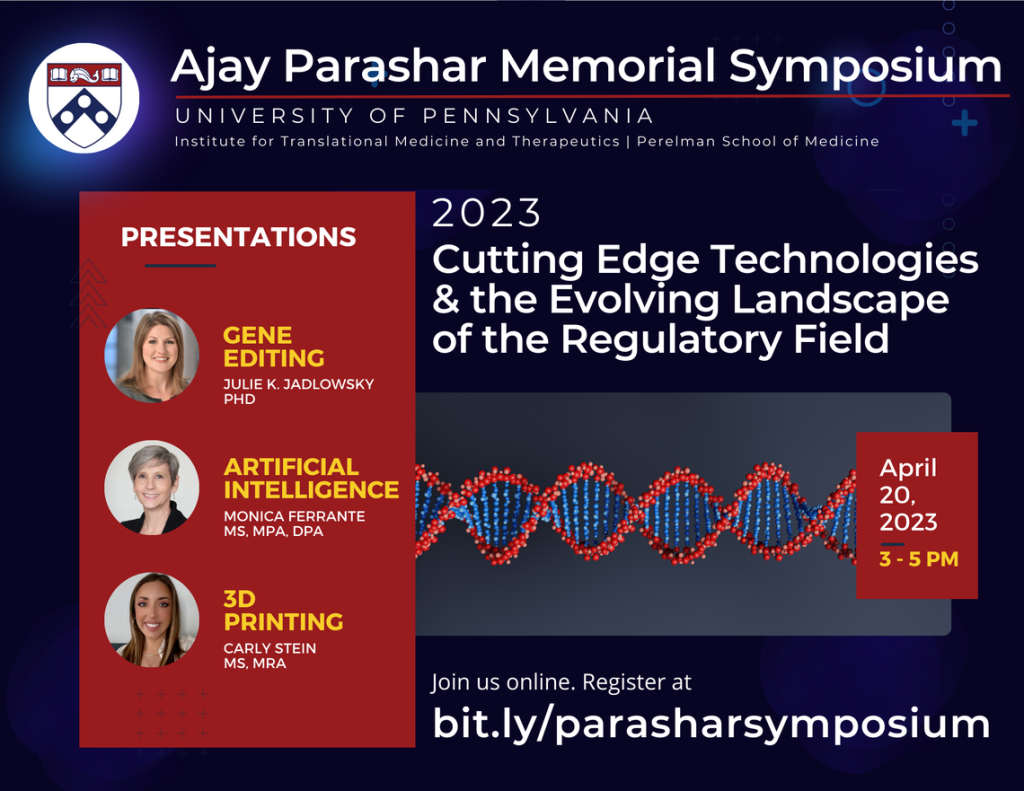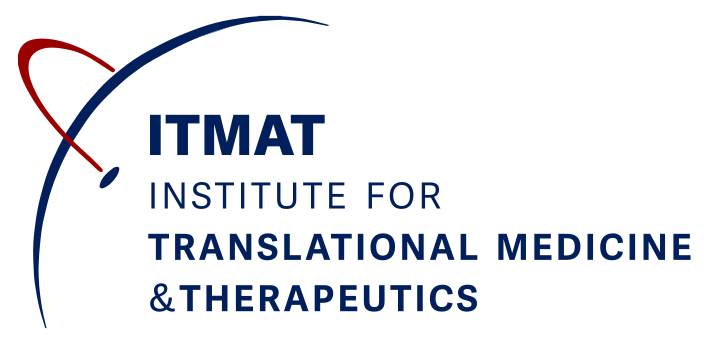
The University of Pennsylvania’s Master of Regulatory Affairs (MRA) program is an online program.
The MRA program is designed to prepare professionals to play key roles in bringing innovative products to market while also ensuring that products are safe and effective. Graduates will be trained in the skills necessary to maximize compliance and minimize risk in the development of FDA-regulated products and will learn both the foundation and application of science-based clinical investigation and corresponding regulations. This is accomplished through a 10-credit unit curriculum consisting of coursework and an experiential capstone project.
For learners interested in a shorter program, the Regulatory Affairs Certificate may be an option. This 4-credit, one-year curriculum introduces learners to Regulatory Affairs and may later be applied toward the MRA.
Our Program
The Master of Regulatory Affairs program is housed in the Perelman School of Medicine at the University of Pennsylvania. The University of Pennsylvania is a top research university and routinely a top-ten National Institute of Health grant-dollar awardee. Being part of a world-class research institution gives you the opportunity to learn from leaders in the field and a close-up view of innovations progressing through the pipeline.
The MRA program has transitioned to an online program. We are excited to leverage this opportunity to increase flexibility for working professionals while continuing to offer students a robust and engaging curriculum, build and foster engaging relationships amongst peers and faculty, and prepare graduates for the next step in their career.
MRA Curriculum
The goal of the MRA curriculum is to provide a broad understanding of the FDA-regulated product lifecycle. The core courses focus on research and development, clinical research, FDA submissions and product registrations, manufacturing, labeling, advertising and post-approval maintenance activities. This allows students to pursue careers in clinical research, regulatory or quality assurance sectors.
The MRA curriculum is designed for working professionals, and it involves a variety of experts from UPenn, the Children’s Hospital of Philadelphia (CHOP), private industry, and the FDA. We encourage students to continue their full-time job and take two courses each term toward the MRA degree. The courses are scheduled in the evenings, typically at 4:00PM or later. The MRA degree requires 10 credit units including coursework and a capstone.
You may choose to take the standard MRA curriculum or elect a concentration in clinical research or quality assurance to further specialize your training. The core courses vary between each concentration.
Concentrations
Standard Curriculum
The MRA curriculum is designed to provide a broad understanding of the FDA-regulated product lifecycle.
Core Requirements
- REG 6190 Research Ethics
- REG 5100 Introduction to Clinical and Translational Research
- REG 6100 Fundamentals of FDA Regulation
- REG 6120 Introduction to Drug Development
- REG 6150 Post-Approval Maintenance of Drugs, Devices, and Biologics
Capstone
- REG 6400 Capstone I
- REG 6410 Capstone II
Electives
- 3 Approved Electives
Sample Study Plan
| Summer | Fall | Spring | |
| Year 1 | REG 5100 Intro Clinical Research
REG 6120 Intro Drug Development |
REG 6400 Capstone I
1. _________________ |
|
| Year 2 | REG 6100 Fundamentals of FDA Regulations
2.______________________ |
3.______________________
4.______________________ |
REG 6410 Capstone II
REG 6150 Post-Approval Maintenance of Drugs, Devices, and Biologics |
For each blank, fill in:
- REG 6190 – Research Ethics for either Spring Yr 1 or Spring Yr 2
- 3 Electives
Quality Assurance
The MRA curriculum with a concentration in quality assurance is designed to provide a broad understanding of the FDA-regulated product lifecycle with a particular focus on GLP and GMP-compliant management of product development and manufacturing.
Core Requirements
- REG 6190 Research Ethics
- REG 5100 Introduction to Clinical and Translational Research
- REG 6100 Fundamentals of FDA Regulation
- REG 6120 Introduction to Drug Development
- REG 6160 Quality Assurance
Capstone
- REG 6400 Capstone I
- REG 6410 Capstone II
Electives
- 3 Approved Electives
Sample Study Plan
| Summer | Fall | Spring | |
| Year 1 | REG 5100 Intro Clinical Research
REG 6120 Intro Drug Development |
REG 6400 Capstone I
1. _________________ |
|
| Year 2 | REG 6100 Fundamentals of FDA Regulations
2. _________________ |
REG 6160 Quality Assurance
3. _________________ |
REG 6410 Capstone II
4. _________________ |
For each blank, fill in:
- REG 6190 – Research Ethics for either Spring Yr 1 or Spring Yr 2
- 3 Electives
Clinical Research
The MRA with a concentration in clinical research is designed to provide a broad understanding of the FDA-regulated product lifecycle with a particular focus on GCP-compliant management of clinical trials.
Core Requirements
- REG 6190 Research Ethics
- REG 5100 0Introduction to Clinical and Translational Research
- REG 6100 Fundamentals of FDA Regulation
- REG 6110 Clinical Study Management
- REG 6120 Introduction to Drug Development
Capstone
- REG 6400 Capstone I
- REG 6410 Capstone II
Electives
- 3 Approved Electives
Sample Study Plan
| Summer | Fall | Spring | |
| Year 1 | REG 5100 Intro Clinical Research
REG 6120 Intro Drug Development |
REG 6400 Capstone I
1. _________________ |
|
| Year 2 | REG 6100 Fundamentals of FDA Regulations
REG 6110 Clinical Study Management |
2. _________________
3. _________________
|
REG 6410 Capstone II
4. _________________ |
For each blank, fill in:
- REG 6190 – Research Ethics for either Spring Yr 1 or Spring Yr 2
- 3 Electives
MRA-ML Dual Degree
The Master of Regulatory Affairs and Penn Law have partnered together to offer the MRA-ML dual degree. The purpose of this dual degree is to expand your knowledge of both regulatory and legal affairs as well as highlight the connection between these two fields. Upon completion of the dual degree, you should have a deeper understanding of the intersections between these two fields.
Dual Degree Curriculum
Students who elect to pursue the MRA-ML dual degree will be required to complete a select number of courses from the MRA and LAW programs. The curriculum is designed to provide knowledge of both legal and regulatory affairs. Students may take 3 LAW courses to replace REG 6190 Research Ethics and 2 electives.
While the MRA program is an online program, many courses in the ML program will be in person. Students who are interested in pursuing the MRA-ML dual degree will be required to attend in-person law classes.
MRA Courses
7 MRA courses based on your selected concentration (see above).
LAW Courses
- LAW 5110 US Law & Legal Methods (required)
- LAW 5280 General Business Law (required)
- LAW 5290 Navigating the Regulatory State (required)
- LAW 5300 Health Law & Policy (foundational course) (Replaces REG 6190)
- 1 upper-level JD course
- 1 upper-level JD or ML course
- 2 additional ML courses of your choosing
Additional JD & ML LAWM courses may be viewed in the graduate course catalog.
Sample Study Plan
| Summer | Fall | Spring | |
| Year 1 | REG 5100 Intro to Clinical & Translational
REG 6120 Into to Drug Development |
REG 6400 Capstone I
REG 6150 Post Approval Maintenance |
|
| Summer | Fall | Spring | |
| Year 2 | REG 6100 Fundamentals of FDA Regulations
LAW 5110 Intro to US Law & Legal Methods (required)
|
REG course
LAW 5290 Navigating the Regulatory State (required) |
LAW 5300 Health Law & Policy (foundational, replace REG 6190)
REG 6410 Capstone II |
| Summer | Fall | Spring | |
| Year 3 | LAW 5280 General Business Law (required) | LAW 5760 Patent Law | LAW 9200 Pharma Reg & Enforcement |
Experiential Learning
Capstone
The Capstone is an intensive project focused on your specific area of interest within Regulatory Affairs. You will develop a detailed Capstone project with defined goals and objectives and should formulate your Capstone around a deliverable that will position you for the next step in your career. The project will be implemented under the direction of a Capstone Advisor, and you are encouraged to select your Capstone Advisor for their expertise in the topic being addressed. You are responsible for leading the design, implementation, and analysis of your work. Your Advisor will guide you, but you will drive the Capstone forward.
During the Spring of your first year in the program, you will develop your project proposal in the REG 6400 — Capstone I course. After your proposal has been approved through the successful completion of this course, you will begin your Capstone in the third term (Summer) of your first year in the program. In the Spring term of your second year in the program, you will submit a deliverable that explains the background of your study, why it is important to study, how you addressed your Capstone, and the outcomes. Your final deliverable will be evaluated by the Program Director with input from your Capstone Advisor. You will earn two credit units for completion of the Capstone — one for completion of an approved Capstone proposal (REG 640) and the second for completion of the Capstone project (REG 6410).
Sample Capstone Projects
- Prepare a policy statement on an ethical consideration in human subjects research
- Design a process improvement and report the outcome
- Develop a regulatory guidance document
- Design and implement a regulatory education training program
Internships
ITMAT Education offers a regulatory education focused internship in partnership with the Sponsor Support Unit (SSU) of the Office of Clinical Research (OCR) that lasts approximately 14 weeks.
The internship is designed to provide a mentored experience in which students gain knowledge about INDs and IDEs. Ideal students for this internship are those who have a keen eye for detail, are willing to read and review clinical trial protocols, consent forms and regulatory documents, and have an interest in sponsor roles and responsibilities.
There is a call for interns in the spring of each academic year. As we approach the call of interns, more information will be shared on how to be considered for the internship.
Additional Regulatory Education related intern or fellow opportunities will be shared as they arise.
Professional Development
Professional Development Workshops
The MRA program offers several professional development sessions each academic year, at least one per fall and spring semester. These sessions are open to all students enrolled in regulatory courses.
Recent topics include:
- Alumni Career Panel
- Survey Design Workshop
Potential/upcoming topics:
- Writing in Regulatory Affairs
- CV/Resume Workshop
The goal is of the professional development sessions is to assist students in their learning and growth during their time in regulatory coursework. These sessions aim to assist students in fostering skill sets that will further their understanding, ability, and careers.
Ajay Parashar Memorial Symposium
In 2023, Regulatory Education launched an annual symposium dedicated to Ajay Parashar, PharmB, MS, MDD, RAC. Ajay was a beloved instructor and mentor in the MRA program always championing innovation.
The symposium features multiple short presentations from Regulatory Affairs affiliates and alumni sharing cutting-edge industry trends, expertise, and conversations for the benefit of current REG students and friends of the program. The symposium includes Q&A and discussion elements.
Regulatory Affairs Courses
University Catalogue
For descriptions of REG courses, please see the University of Pennsylvania catalogue.
Course Scheduling
Visit the ITMAT Education Courses page for an up-to-date listing of which courses are offered each semester, as well as dates, times, and instructors.
Elective Courses
In addition to the courses listed on this page, MRA students may take additional REG courses as electives or courses outside the department. Some courses may be offered on-site at Penn rather than online.
- REG 6180 Introduction to Vaccine Development
- REG 6210 Cell & Gene Therapy
- REG 6240 Applied Regulatory Processes of Vaccines and Biologics
- REG 6250 Manufacturing Novel Therapies & Imaging Agents
- REG 6260 Patent Law for Drug Development
- LAWM 5360 Fundamentals of US Legal Research
Classes that may not be offered online:
- REG 6220 New Trends in Medicine & Vaccine Discovery
- MTR 6200 Commercializing Translational Therapeutics
- HCMG 8990 Management & Economics of the Pharma, Biotech & Medical Device Industries
- PUBH 5020 Introduction to Epidemiology
- LAW 5220 Compliance and Corporate Governance
- LAW 5290 Navigating the Regulatory State
- LAW 5300 Intro to Health Law & Policy
- LAW 9200 Pharmaceutical Regulation & Enforcement
- BMIN 5010 Intro to Biomedical Informatics
- BMIN 5020 Databases in Biomedical Research
- BIOE 5520 Bioethics & the Law
- BIOE 5750 Health Policy
Please review Penn’s catalogue for course descriptions.
Regulatory Affairs Tuition
Tuition rates and fees are listed on the Master’s Program Costs website. Tuition is listed per course unit and students are able to register for a maximum for 2 course units per term. View the program tuition costs by visiting the Master’s Program Costs website and scroll to the Regulatory Affairs section, click on the title to expand and view the tuition.
Penn employees have access to tuition benefits, learn more about the Graduate Tuition Benefits.
The MRA degree has a total of 10 course units; the Regulatory Affairs Certificate has a total of 4 course units. Elective course units taken in the summer will be determined by the home school that offers that course.
FY 2023 is a 2.9% tuition increase.
Additional Costs
Regulatory Affairs is a fully online program. As such, students are expected to have technology tools (including a personal computer with a working webcam and microphone) and Internet access sufficient for video calling. These costs depend on the type of technology students choose; many students will find that they already own appropriate equipment.
In general, Regulatory Affairs courses do not require the purchase of textbooks, with the exception of REG 6260: Patent Law for Drug Development, for which textbook costs range from $40-150. Courses taken as electives outside of Regulatory Affairs may have additional textbook costs.
Student Registration and Financial Services
Please contact Penn’s Student Registration and Financial Services for assistance with financial aid options or information.
Disclaimer
Please note that policies concerning admissions, curriculum, funding and financial aid are subject to change. Additionally, though variations in the curriculum may be possible, any changes will need prior approval and may have financial implications. This website is meant to provide preliminary general overview information only. Students interested in or enrolled in the program should seek personal advising from relevant faculty and staff.
MRA Admissions
- Applicants must have a bachelor’s level degree
- Applicants must have a minimum of one year of relevant experience (e.g., Regulatory Specialist, Research Project Manager, Clinical Research Coordinator, FDA Scientific Reviewer)
- Applications for each fall semester should be submitted by May 1
Application Support
ITMAT Education Faculty and Administration are glad to connect with interested applicants throughout the year. Through an initial consult, program faculty or staff can gain understanding to which program may best align with your career goals, connect to current students or faculty for additional insight, answer questions about the application process, and provide feedback on project proposals.
Contact us and a member of the team will reach out to set a time to discuss your interests.
Application Process:
Applicants must submit a full application which contains three parts:
1. Online MRA Program Application
which includes the following documents:
- Resume
- Transcripts
- Upload unofficial undergraduate and graduate, if applicable, transcripts into the application system
- Personal statement
- Please submit a personal statement that responds to the following two prompts. Each response should be 400 words or less.
- What are your career goals, and how does the MRA program help you meet your goals?
- Discuss a significant contribution you have made in your current or former position. What did you set out to achieve? What was the result?
- Please submit a personal statement that responds to the following two prompts. Each response should be 400 words or less.
2. Three letters of recommendation:
- Recommenders may be faculty or employers
- Letters should address the following:
- The suitability of the MRA program for the student’s stated career goals
- The student’s academic ability
- The online application system supports electronic submission of the letters
3. Application Fee: $45
- Payable on submissions of the application
Other:
- English Language Proficiency (e.g. TOEFL score or degree from an English-language institution) for applicants whose first language is not English)
- GRE scores are not required
We believe that a diverse clinical and translational science workforce will enable better science. Diverse teams of scientists bring an important range of experiences and perspectives that propel the collective potential for innovation. Thus, we seek to draw students from diverse backgrounds, including diversity of race, ethnicity, work and life experiences, interests, culture, socioeconomic status, sexual orientation, and those with disabilities.
Student Resources
Please review our Student Resources page for a full list of policies and information before applying.
Non-discrimination/Disability Policy
The University of Pennsylvania values diversity and seeks talented students, faculty and staff from diverse backgrounds. The University of Pennsylvania does not discriminate on the basis of race, color, sex, sexual orientation, gender identity, religion, creed, national or ethnic origin, citizenship status, age, disability, veteran status or any other legally protected class status in the administration of its admissions, financial aid, educational or athletic programs, or other University-administered programs or in its employment practices.
Questions or complaints regarding this policy should be directed to the Executive Director of the Office of Affirmative Action and Equal Opportunity Programs, Franklin Building, Suite 421, 3451 Walnut Street, Philadelphia, PA 19104-6205; or (215) 898-6993. Specific questions concerning the accommodation of students with disabilities should be directed to the Office of Student Disabilities Services located within Hamilton Village at 220 South 40th Street.
Jeanne Clery Disclosure of Campus Security Policy and Campus Crime Statistics Act
The federal Jeanne Clery Disclosure of Campus Security Policy and Campus Crime Statistics Act, as amended, requires colleges and universities to provide information related to security policies and procedures and specific statistics for criminal incidents, arrests, and disciplinary referrals to students and employees, and to make the information and statistics available to prospective students and employees upon request. The Campus SaVE Act of 2013 expanded these requirements to include information on and resources related to crimes of interpersonal violence, including dating violence, domestic violence, stalking and sexual assault. Federal law also requires institutions with on-campus housing to share an annual fire report with the campus community.
In addition, the Uniform Crime Reporting Act requires Pennsylvania colleges and universities to provide information related to security policies and procedures to students, employees and applicants; to provide certain crime statistics to students and employees; and to make those statistics available to applicants and prospective employees upon request.
To review the University’s most recent annual report containing this information, please visit the Annual Security and Fire Safety Report or the Penn Almanac Crime Reports.
You may request a paper copy of the report by calling the Office of the Vice President for Public Safety and Superintendent of Penn Police at 215-898-7515 or by emailing vp@publicsafety.upenn.edu.
COVID-19 Pandemic: Spring 2020
Recognizing the challenges of teaching, learning, and assessing academic performance during the global COVID-19 pandemic, Penn’s admissions committees for graduate and professional programs will take the significant disruptions of the COVID-19 outbreak in 2020 into account when reviewing students’ transcripts and other admissions materials as part of their regular practice of performing individualized, holistic reviews of each applicant. In particular, as we review applications now and in the future, we will respect decisions regarding the adoption of Pass/Fail and other grading options during the period of COVID-19 disruptions. An applicant will not be adversely affected in the admissions process if their academic institution implemented a mandatory pass/fail (or similar) system for the term or if the applicant chose to participate in an optional pass/fail (or similar) system for the term. Penn’s longstanding commitment remains to admit graduate and professional student cohorts composed of outstanding individuals who demonstrate the resilience and aptitude to succeed in their academic pursuits.
International Students
The Master of Regulatory Affairs and Regulatory Affairs Certificate degree programs are offered by the University of Pennsylvania, an institution of higher education authorized to confer degrees and certificates conferring academic credit under applicable laws of the United States. Students who are interested in participating in the program from countries other than the United States are advised that each jurisdiction may have its own laws and regulations governing online educational programs, and some jurisdictions may not recognize course credit or an online degree awarded by the University as satisfying local requirements for professional licensure, employment qualification, or other purposes. Before enrolling in this program, prospective students should investigate their jurisdiction’s treatment of foreign online programs to ensure that participation in this program will meet their objectives.
The Master of Regulatory Affairs and the Regulatory Affairs Certificate are both STEM OPT extension eligible programs for holders of F-1 visas.
If you have additional questions about the format of the program or its ability to fit your schedule, access, etc. please contact program staff.
Accreditation
The University of Pennsylvania is accredited, but there is no separate accreditation for regulatory affairs programs.
Student Resources for Regulatory Affairs
Regulatory Affairs Documents:
- MRA Handbook (2023-2024)
- MRA Handbook (2022-2023)
- ITMAT Certificates Handbook (2022-2023) (See Regulatory Affairs Certificate)
- MRA Handbook (2021-2022)
Useful Penn Links:
- Canvas (course content management system)
- Penn Academic Calendar (actual course dates may vary from this calendar)
- Student Registration and Financial Services
- Path@Penn (verify registration, billing, contact info)
- Tax Liability for Graduate Tuition Benefits
- Penn Student Support Resources
- Vaccination Requirements
International Students
The Master of Regulatory Affairs and Regulatory Affairs Certificate degree programs are offered by the University of Pennsylvania, an institution of higher education authorized to confer degrees and certificates conferring academic credit under applicable laws of the United States. Students who are interested in participating in the program from countries other than the United States are advised that each jurisdiction may have its own laws and regulations governing online educational programs, and some jurisdictions may not recognize course credit or an online degree awarded by the University as satisfying local requirements for professional licensure, employment qualification, or other purposes. Before enrolling in this program, prospective students should investigate their jurisdiction’s treatment of foreign online programs to ensure that participation in this program will meet their objectives.
The Master of Regulatory Affairs and the Regulatory Affairs Certificate are both STEM OPT extension eligible programs for holders of F-1 visas.
If you have additional questions about the format of the program or its ability to fit your schedule, access, etc. please contact program staff.
PennBook Disclosures
Please review the University of Pennsylvania required disclosures.
Program Staff

Leadership



Emma A. Meagher, MD
ITMAT Education Program Director
Rachel McGarrigle, MSEd
Education Director
Andrew Fesnak, MD
Program Director
Shelby Woodson, Graduated 2022

Current Position: Senior Regulatory Affairs Specialist at Gene Therapy Program
What attracted you to the MRA program: While working in manufacturing, I began working on a project dealing with cleanroom development, and that is what pushed me to want to pursue a Master in Regulatory Affairs. There were 3 main things that attracted me to this program specifically: flexibility, faculty, and curriculum. Most of the classes throughout the program were scheduled in the evening, which allowed for ample flexibility. This allowed me to be able to continue my full-time job while furthering my education. It also allowed me time to be able to participate in a shadowing opportunity, which really helped me decide what I wanted to do with my career after graduation. Classes were taught by faculty and people in the biopharmaceutical industry that were leading experts in their fields. It allowed me to expand my knowledge into different regulated fields (ex. devices, combination products, and biologics) and expand my network. Lastly, the curriculum within the MRA program was really intriguing to me. I liked that they had 2 concentrations you could pick from to go along with the MRA degree. I was able to get a concentration in Quality Assurance which is something I have always had interest in, and I was given the opportunity to improve my risk-based analysis skills all while obtaining my regulatory degree.
What you enjoyed most about the MRA program: I enjoyed the MRA curriculum the most! It exposed me to many different aspects of drug development. I was able to gain experience of what it takes to go from having an intellectual property all the way through the submission process for a drug, device, or combination product. There were a plethora of guest lecturers which added a lot of value to class discussions and the overall learning experience within the MRA program. There were also many group projects, which helped prepare me for my current job. It gave me experience with presenting, answering questions and interpreting critical feedback. This prepared me for agency meetings that we may have during the pre-IND and IND submission process.
How the MRA program helped further your research and career goals: The MRA Program allowed me to finally take a step out of the lab and into the field I’ve always wanted to be in. I was able to accept a new position where I help with writing preclinical study reports and IND applications.
Anna Tust, Graduated 2021

Current Position: Senior Specialist, Global Labeling Lead at Merck
What attracted you to the MRA program: The MRA program provided me with an opportunity to transition from a bench scientist into a regulatory professional. Similarly to other students, I was working in the lab when I started to learn about the field of regulatory affairs. I knew this program could provide me the foundation to begin a regulatory career.
What you enjoyed most about the MRA program: I loved building connections with leaders in the regulatory field, as well as building connections with classmates. Many of the courses are led by current regulatory professionals, who are able to provide real-world applications of course material.
How the MRA program helped further your research and career goals: The curriculum of the MRA program helped further my career by providing supplemental information to regulatory interactions in the workplace, giving me more confidence in my own work while interacting with regulatory professionals. Also, the connections made during my time in the MRA program led me directly to my next career move!
Fareya Zubair, Graduated 2021

Current Position: Global Regulatory Affairs Manager at Nuvalent
What attracted you to the MRA program: I was attracted to the MRA program due to the variety of courses that were offered and also due to the various professors that were teaching these courses. They were industry professionals who brought a wealth of knowledge to the program
What you enjoyed most about the MRA program: The thing I enjoyed the most about the MRA program was the people I met! The MRA program brought a wonderful network of people into my life between professors, industry professionals, and my fellow classmates. We are all still connected a year out of the program.
How the MRA program helped further your research and career goals: Through the MRA program I was able to utilize different regulations regarding rare diseases and orphan indications in my work. I also learned how to blend different areas of drug development together and make it very interdisciplinary at work. This allowed me to teach my direct reports about regulatory affairs.
Tom Furmanak, Graduated 2021

Current Position: Manager, Translational Science at Allogene Therapeutics
What attracted you to the MRA program: I was drawn to the MRA program because of the flexibility it offered in conjunction with the expertise of the instructors. Additionally, I was interested in learning more about regulatory affairs so that I could better understand the drug development process and help to move novel cell and gene therapies from the bench into the clinical setting.
What you enjoyed most about the MRA program: I really enjoyed the collaborative learning environment that the MRA program offered. The courses and projects were focused on real-world scenarios and working with a team which greatly mimics drug development outside the classroom.
How the MRA program helped further your research and career goals: The knowledge, skills, and connections I made while enrolled in the MRA program have allowed me to move into a more central role in the drug development process. This allowed me to become involved in clinical science, regulatory, and strategy at my current position, greatly expanding my skill set and development.
Jacquelyn Teson, Graduated 2020

Current Position: Regulatory Affairs Associate at Lungpacer Medical Inc
What Attracted Me to the MRA Program: I was interested in the field of compliance but was not sure which direction I should take that interest. After some research, I found the MRA program. A Masters in Regulatory Affairs caught my eye because of the variety of specializations within the field itself. The degree could provide a foundation that I could tailor to my own preferences from a professional standpoint.
What I enjoyed most about the MRA Program:
I most enjoyed the opportunity to engage with regulatory affairs professionals. The program offered access to high-level members of both industry and academia, who were always friendly, informative, and accessible. I also enjoyed the opportunity to gain working experience through a collaborative MRA-OCR internship at Penn.
How the MRA Program helped further my Research & Career Goals: Through the MRA program, I was able to clarify my goals and take the next step in my career. I knew that I wanted a career in compliance, but I was not sure which area of compliance best suited my interests. Early on in the MRA program, I found that medical devices consistently drew my attention. I was able to focus some of my coursework, including my capstone project, on medical devices to support my future in the medical device space.
The MRA program also provided me with an opportunity to gain professional experience through an internship in collaboration with the office of clinical research. This was valuable for my understanding of the Regulatory Affairs field and the interview process for prospective positions. I was able to obtain a position as a Regulatory Affairs Associate at a small medical device company and am excited to take the next step in my career.
James Gordon, Graduated 2020

Current Position: Associate Consultant at ZS
What Attracted Me to the MRA Program: After college, I knew I wanted to pursue a graduate degree and there are many different paths that you can take at the onset of a career in clinical research. While working at the Children’s Hospital of Philadelphia, my manager suggested that I consider the program at Penn based on my interest and experience in conducting clinical trials with investigational devices. After researching the program, I thought the program goals and focus would be an excellent complement to my career interests and ambitions.
What I enjoyed most about the MRA Program:
The opportunity to study at a world-class institution like the University of Pennsylvania is invaluable in many ways. The program provided me with unparalleled access to the brightest minds in the field. Many of the professors are industry professionals with whom you can network and discuss future career ambitions or perspectives on the current regulatory landscape. I enjoyed the camaraderie that developed between the members of my cadre. We each had similar interests in the program and different clinical backgrounds which allowed us to learn from one another and share our diverse insights during classroom discussions. I also truly enjoyed working with my capstone advisor. The opportunity to learn one-on-one from an expert in my project area and the mentorship she provided, and continues to provide, are one of the highlights of the program for me.
How the MRA Program helped further my Research & Career Goals: The comprehensive graduate program has equipped me with the tools and knowledge that I needed to grow professionally. While the program is an education program, the professors also help you to grow professionally and the capstone project proves you with an opportunity to explore a topic of your interest in depth beyond the standard curriculum. As a result of the professional relationships I built during the program, I was offered a position that has launched my career in regulatory affairs and expedited my career trajectory.
Megan Brewster, Graduated 2019

Current Position: Regulatory Affairs Specialist at Organogenesis, Inc.
What Attracted Me to the MRA Program: Regulatory Affairs had been an area I was interested in since interning at a Pharma company in college, but I wasn’t sure how to make the transition from being a scientist in the lab to a role in regulatory. When I saw that Penn was offering a Masters in Regulatory Affairs degree, I knew it would be a great opportunity for me to move into the world of regulatory and that it would provide me with the opportunity to build on the knowledge I already had and put it into action as a regulatory professional.
What I enjoyed most about the MRA Program: One of my favorite aspects of the MRA program was taking classes with professors who had a wide breadth of real-world expertise. My professors throughout the program had experience working in regulatory affairs in academia, at biotechs, or at pharma companies, and were able to share their experiences and offer insight on how the material we were learning would be put into use when in a regulatory affairs role.
How the MRA Program helped further my Research & Career Goals: I knew that upon graduating from the MRA program I wanted to transition into a regulatory career within the industry. The MRA program gave me not only the knowledge I needed to succeed in finding the right position, but also the confidence to do so. It was wonderful to go into interviews and be able to confidently converse and be a part of a meaningful dialogue concerning topics that were covered in the program.
Laura Steimer, Graduated 2019

Current Position: Labeling Specialist at ZimVie Spine
What Attracted Me to the MRA Program: When it came to the decision to continue my education or not, I was pleasantly surprised to find that Penn offered a degree which seemed to fit perfectly with my current role as Quality Assurance in a preclinical research laboratory and future career aspirations in drug development. The MRA program stood out to me as offering a wide breadth of coursework while still providing sufficient flexibility in its hybrid in-class/online curriculum for students working full time.
What I enjoyed most about the MRA Program: I enjoyed how the MRA program offered in-depth exposure to many aspects of clinical research and drug development which are far outside of the scope of my current job responsibilities. The sheer variety of instructors and guest lecturers from industry was excellent and made for an engaging learning experience.
I also very much enjoyed getting to know the other students in my cohort, all of whom worked in many interesting fields at Penn. The small cohort sizes and discussion-based courses seemed to lend themselves well to building strong relationships with my classmates.
How the MRA Program helped further my Research & Career Goals: The MRA program has given me a completely new level of understanding of my industry, which has allowed me to approach my role in a different way. I am now able to meaningfully convey the “bigger picture” to our preclinical research staff during training sessions and better interface with my laboratory’s collaborators and sponsors. The MRA program has provided me with the diversity of knowledge and experience to both excel in my current role and open doors for career opportunities in the future.
March 2023 Regulatory Affairs Interest Session

The Master of Regulatory Affairs program (MRA) is accepting applications for the Fall 2023 academic year. The MRA program is an online program and is designed to prepare professionals to play key roles in bringing innovative products to market while also ensuring that products are safe and effective. Graduates will be trained in the skills necessary to maximize compliance and minimize risk in the development of FDA-regulated products and will learn both the foundation and application of science-based clinical investigation and corresponding regulations. The program curriculum includes 10 course units consisting of coursework and an experiential capstone project.
Our online program and certificate allow for increased flexibility for working professionals while continuing to offer students a robust and engaging curriculum, build and foster engaging relationships amongst peers and faculty, and prepare graduates for the next step in their career.
Join Program Director, Andrew Fesnak, MD, MHCI, Associate Director, Bethany Sanghani, and program alumni for a 1-hour virtual interest session to learn more: Tuesday March 21, 2023 at 12 pm.
You may register for the session via Zoom.
MRA & RA Certificate applications are due by May 1, 2023. For more information, please visit the REG programs overview. You may also reach out to Bethany Sanghani, bgermany@upenn.edu.
Ajay Parashar Memorial Symposium, April 2023

Ajay Parashar Memorial Symposium: Cutting Edge Technologies and the Evolving Landscape of the Regulatory Field
Date: Thursday, April 20, 2023, 3-5 p.m.
Please join us for the inaugural symposium in dedication of Ajay Parashar, PharmB, MS, MDD, RAC. Ajay was a beloved instructor and mentor in the MRA program always championing innovation.
The symposium will feature 3 presentations focused on the current regulatory landscape and how the landscape intersects with cutting-edge therapeutic and diagnostic technologies. We will conclude with a panel discussion on the evolution and future direction of regulatory pathways.
Presentations
- Gene Editing, Julie K. Jadlowsky, Ph.D
- Artificial Intelligence, Monica Ferrante, MS, MPA, DPA
- 3D Printing, Carly Stein, MS, MRA Alumni
Julie K. Jadlowsky, Ph.D is the Director of Translational Science Operations in the Center for Cellular Immunotherapies at the University of Pennsylvania, Philadelphia, USA. She studied HIV transcriptional regulation at Case Western Reserve University, where she completed her Ph.D. in Molecular Biology and Microbiology. She joined the University of Pennsylvania in 2010 as a postdoctoral scholar studying high affinity T cell receptors in HIV. Since leaving the bench in 2013, her focus has been on translating genetically modified adoptive cell therapies developed in the research laboratories into first-in-human clinical trials for oncology and infectious disease indications. As Director of Translational Science Operations, she is responsible for oversight and strategic direction related to the opening of investigational new drug applications focused on genetically modified T cells.
Monica Ferrante is a Regulatory, Quality & Clinical executive who has worked for and consulted with medical device companies across a broad spectrum of products with both start-ups and large multi-national corporations. She has experience with all regulatory processes related to the development, submission, market clearance and post approval requirements for devices and combination products. She has also supported several Clinical Studies with regards to regulatory requirements, clinical trial database registrations, and FDA Investigations of clinical sites, adverse event review and study documentation. Education includes a BS in Biomedical Engineering, MS in Physiology, MPA and DPA in Public Policy. One Patent issued.
Carly Stein, a recent Penn alum, completed her first Master’s degree in Regulatory Affairs at Penn in 2022. A scientist by training with many years spent at the bench studying basic molecular science, she transitioned into the world of clinical research a few years prior where she worked as Sponsor Data Manager of CAR T cell therapy clinical trials. Shortly promoted to Sr. Clinical Trials Project Manager, Carly now manages the operations of first-in-human cancer immunotherapy CAR T cell trials in the Center for Immunotherapies. Carly recognized that an education in regulatory affairs would benefit her understanding of how human research is conducted safely and responsibly. Carly is also working towards her second Master’s degree in Law, which compliments the MRA by providing statutory context to the regulations and the regulatory bodies that govern, and she is expected to graduate in May 2023. Carly hopes to continue working in the CAR T cell space, providing innovative, personalized cell and gene-based therapies to patients in the fields of cancer, autoimmune disease, infectious disease, and organ and bone marrow transplantation, a mission that resonates deeply with her.

